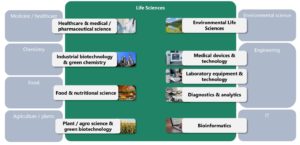LabBench2Business is focusing on founding endeavors in the field of Life Sciences. Even though the term sounds familiar to most of us, a thorough understanding is often lacking and questions like “Which disciplines are actually included in Life Sciences?” or “Are Life Sciences and Biotechnology not the same?”, arise. While some adapted the definition of biotechnology “everything that heals, fuels and feeds the world” to Life Sciences, it does not reflect the multifaceted and broad nature of the field.
As there are many definitions of Life Sciences out there, we at LabBench2Business thoroughly discussed the strengths and limitations of these definitions in our team to build our view on Life Sciences. In essence, our definition follows three basic concepts:
- Life Sciences always involves organisms, either direct (e.g. when cultivating bacteria strains or altering viruses for therapeutic applications) or indirect (when using lab equipment to cultivate bacteria or using a medical device to detect diseases)
- Life Sciences is an interdisciplinary industry and has interfaces to a diverse set of industries ranging from e.g. Healthcare and Chemistry to Engineering and IT
- Life Sciences is science-driven and thus relies on scientific insights
Based on these basic concepts, we came up with nine disciplines that are included in Life Sciences but – due to the interdisciplinary character – have interfaces to other industries.

Healthcare & medical / pharmaceutical science put humans and animals in focus and aim to either prevent their health or treat diseases.
Industrial biotechnology & green chemistry uses organisms (such as bacteria, yeast, algae) or component cells like enzymes for sustainable processing and production of chemical products, fuels and materials.
Food & nutritional science studies the nature of food, food processing and how organisms assimilate food to improve food, food availability and nutrition
Plant / agro science & green biotechnology included the application and alteration of plants and other photosynthetic organisms with the aim to improve plants and agricultural crops
Environmental Life Sciences targets environmental and environmental health challenges with means of organisms.
Medical devices & technology entail all technical solutions to either prevent health or monitor and/or treat diseases.
Laboratory equipment & technology include all methods, tools and equipment used by scientists working in a laboratory – from molecular kits to technical equipment.
Diagnostics & analytics comprise all methods, tools and equipment to do diagnostics and analytics – from molecular level to technical machinery.
Bioinformatics develops methods and software tools for collection, classification and analysis of Life Science-related data with the aim of making these data applicable to one of the Life Science disciplines mentioned above.
If you are interested in our start-up support, but are not sure if we cover your discipline, please just contact us and we can discuss it.